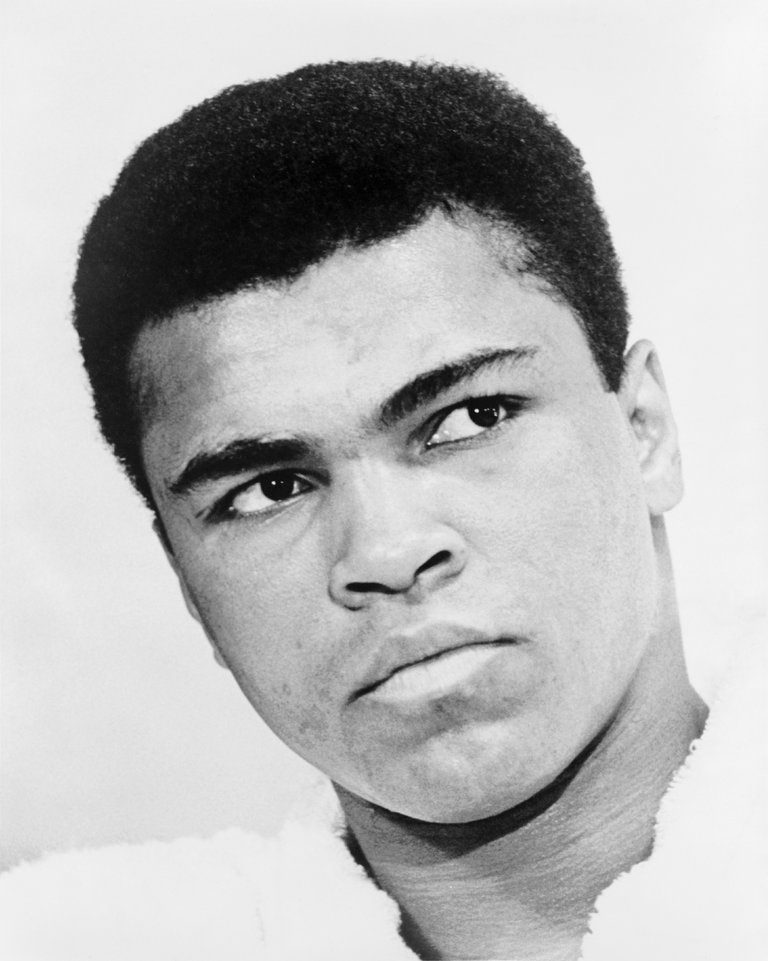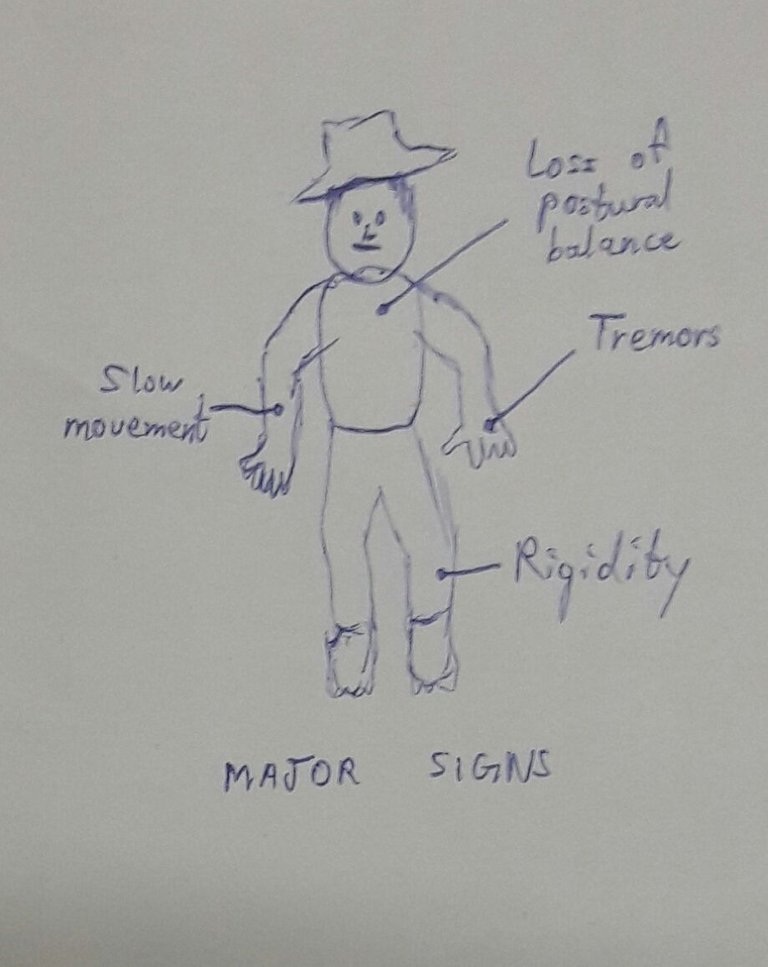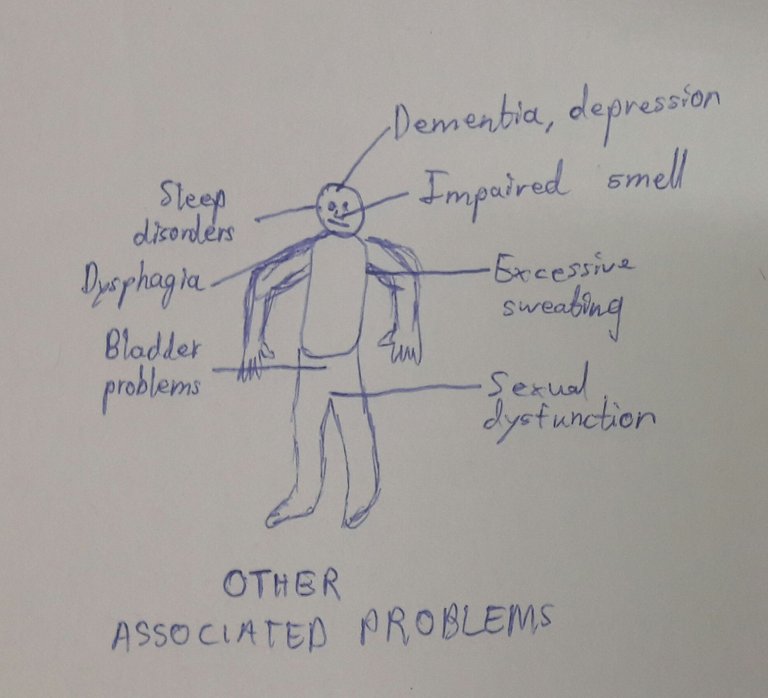Muhammad Ali is one of the most popular boxers, or sportspersons for that matter, of our times.
Shortly after Ali's retirement from boxing in 1981, rumours began circulating about his health.
His speech had become slurred, he shuffled and he was often drowsy.
In 1984, he was diagnosed with Parkinson’s disease.

Yes, my topic is Parkinson’s disease as is obvious. Now this is another neurological disorder (why do I love damaged brains so much?!) and has no real known cause.
Now what happens? There is a part of your brain called the substantia nigra which is a component of the basal nuclei of the brain. This disease causes gradual destruction of the dopaminergic neurons of the substantia nigra.
In simpler words, the dopamine producing neurons gradually degenerate.
Since dopamine promotes motor activity, the decreased dopamine leads to increased effort being needed for movement. This consequently leads to stiffness and rigidity., which are the main symptoms (more on that below)
Causes
It is still unknown as to what exactly causes this condition. However, the following two factors are the most implicated:-
- Genetics:- Is it even a surprise here? Of course your genes are responsible. While it has been linked to various genes, it has not been conclusively proven to be entirely genetic in nature.
- Environmental factors:- Ol' Muhammmad Ali was rumoured to have been affected due to the blows he received to his head during his career. Some toxins may also lead to parkinsonism though it is uncommon.
Signs and symptoms
Major signs are:-
- Tremors in the hand/arm, especially while at rest
- Slowness of movement
- Muscle rigidity
- Loss of postural balance
Other problems may arise as a consequence:-
- Mental symptoms such as dementia and depression. The cognitive abilities are affected.
- Physical problems such as sleep disorders, sexual dysfunction, bladder problems, difficulty in swallowing, excessive sweating and salivation, impaired smell.


Diagnosis
This condition cannot be diagnosed easily. There are no definite tests for diagnosing it. Hence, a carefully elicited medical history is taken and on its basis, medication is provided. Improvement in symptoms usually confirms the existence of this condition. Other tests such as imaging may be done to rule out other conditions which may cause parkinsonism.
Treatment
This disease has no known cure, however, most symptoms can be controlled. Following are the methods used:-
- Medication:- Most effective drug is levodopa, which is converted to dopamine within the body. It can lead to drastic improvement although it shows undesirable side effects with prolonged use.
- Surgery:- It is done in those whom medication is not sufficient enough. The common surgical procedure used is deep brain stimulation.
- Physiotherapy/exercise:- There is evidence that this helps in improvement of the motor symptoms.
Sources
https://www.mayoclinic.org/diseases-conditions/parkinsons-disease/basics/tests-diagnosis/con-20028488
https://www.nhs.uk/conditions/parkinsons-disease/symptoms/
https://en.wikipedia.org/wiki/Parkinson%27sdisease#citenote-NIH2016-1
Pic from Pixabay
Sketches by me (ABSOLUTELY NO COMMENTS ABOUT THEM!)
Nice information
Good research on this. I deal with people with Parkinson's disease in a physical therapy clinical setting. It is a very upsetting disease to see up close and personal. It's as if the person isn't "in it" and all you're talking to is a shell of a person. This is a more severe case of parkinson's, but even interacting with people with more milder forms of Parkinson's makes you understand fully what its about.
Thanks :)
It is quite sad to see how this condition changes people so drastically, its like watching someone die in slow motion.
My gran had parkinsons. She was an amazing athlete and competed at masterslevel until the age of 65 when se was diagnosed. The worst part was knowing how busy and active she alwas were until the disease took over. She just couldnt do anything for her, not meds nor deep br
It reminds of my grandfather, he died when I was still a young kid. I don't recall him having parkinsons but after an accident, he was never the same again; like, he couldn't speak or recognize anyone and a lotta other problems.
Some diseases cannot be cured, one can only hope that one doesn't get affected...hopefully there'll be a cure for this in time.
Your post was mentioned in the hit parade in the following category:Congratulations @stelmar!